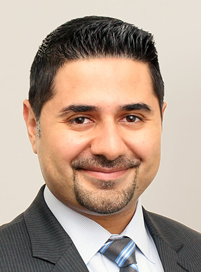Advances in technology are transforming the entire spectrum of rheumatology practice from basic research to patient self-management. Two TechMed Track sessions on Sunday will explore some of the latest advances in self-help for rheumatologists and for patients with rheumatic illnesses.

“The smartphone has been a revolution in technology,” said Suleman Bhana, MD, a private practice rheumatologist at Crystal Run Healthcare in the Hudson Valley area of New York and early technology adapter. “We have this powerful computer in our pockets, so it makes sense to utilize it for our patients. We can, and should, embrace technology in ways that are safe, responsible and helpful to our patients and our practices.”
Dr. Bhana will explore the variety of technology tools rheumatologists use to help them diagnose, manage and care for patients during the clinical symposium Tech Tools for Rheumatologists Version 2.0 from 9:00 – 10:00 am.
What can a phone do for the typical rheumatologist? Replace a number of expensive single-use devices, for starters.
Take capillaroscopy in Raynaud’s. The rheumatologist can buy an expensive dermatoscope or pay $65 for a phone attachment that captures photos and video as good or better than the $1,000 device.
Need photomicroscopy? No need to spend $3,000 for a dedicated camera and microscope mount. A $25 plastic mount allows almost any smart phone to capture high definition video or high resolution still images.
“You can even use Facetime or Skype or some other video application and live stream it across the world,” Dr. Bhana said. “Then there are software add-ons that let you make your EHR more useful and more efficient. And apps that you can recommend to patients that can help them deal with their rheumatologic disease more effectively.”
Other apps can help patients deal with chronic pain using mindfulness and meditation exercises. But there are fewer tools to help younger patients with JIA.

“There are self-help tools that improve pain outcomes and health-related quality of life, things that are important to kids and their families,” said Mark Connelly, PhD, pain psychologist and Professor of Pediatrics at The Children’s Mercy Hospital Kansas City. “But access to those tools continues to be relatively limited. Digital technologies can put those tools directly into the hands of kids who need them the most, kids with JIA.”
Dr. Connelly will discuss the results of a clinical trial using a web-based tool for adolescents with JIA during Digital Health: Optimize Juvenile Idiopathic Arthritis: A Self-Management in Youth and Young Adults from 2:30 – 4:00 pm on Sunday. The five-year study examined an integrated website that included pain management, coping skills, interactive media and social support .
Mobile technologies are outpacing conventional web-based tools such as portals, Dr. Connelly said. JIA developers are keeping pace.
Jennifer Stinson, RN, PhD, Mary Jo Haddad Nursing Chair in Child Health at The Hospital for Sick Children in Toronto, Canada, will discuss iCanCope With Pain, an integrated web- and phone-based app that specifically addresses the needs of adolescents with pain. It uses health management strategies to teach adolescents and young adults specific pain management skills in response to specific situations.
“The app collects daily information about pain and mood and how much pain is interfering with activities,” Dr. Connelly said. “An algorithm then uses this information to offer very specific recommendations they might be able to use right at the moment.”
Younger kids get their own self-management tools in the form of an iPad game being developed by Sara Ahola Kohut, PhD, a post-doctoral research fellow in pediatric pain assessment at The Hospital for Sick Children. She will discuss the game, which is based on a typical “match 3” game with demons and weapons to fight them. But in this case, the demons are pain and disease and the weapons are proven self-help tools such as distraction, relaxation, and medication.
CLINICAL PRACTICE TRACK
Tech Tools for Rheumatologists Version 2.0
9:00 – 10:00 am Sunday • Room 150A
Digital Health: Optimize Juvenile Idiopathic Arthritis: A Self-Management in Youth and Young Adults
2:30 – 4:00 pm Sunday • Room 204A
